Canada
Canadian Lender’s Association Awards Leading Executives and Companies
November 11, 2019 Today the CLA announced the winners for its 2019 Leaders in Lending Awards. Highlighting the efforts of exceptional players within the fintech and alternative finance fields, the awards seek to “celebrate the industry and celebrate all the cool fintech things happening in Canada,” according to the CLA’s Strategic Partnerships Director Tal Schwartz.
Today the CLA announced the winners for its 2019 Leaders in Lending Awards. Highlighting the efforts of exceptional players within the fintech and alternative finance fields, the awards seek to “celebrate the industry and celebrate all the cool fintech things happening in Canada,” according to the CLA’s Strategic Partnerships Director Tal Schwartz.
Now in its second year, the Leaders in Lending Awards are split into two categories, with one focusing on the efforts of companies in the industry and the other on individual executives. 2019 will be the first year that the latter of these categories is incorporated. The awards will be imparted to their new owners at the Canadian Lenders Summit later this month, where a special prize will also be given to one winner from each category.
Among the winners in the first category are Borrowell, IOU Financial, and Michele Romanow’s Clearbanc. While making an appearance in the second category are David Gens of Merchant Growth, Paul Pitcher from SharpShooter Funding, Smarter Loans’ Vlad Sherbatov, and Kevin Clark from Lendified.
The criteria for the awards were based upon three tenets, these being a commitment to the “use of advanced fintech solutions” to solve challenges in the lending process, the “implementation of new or innovating lending strategies or business models,” and evidence of successful outcomes following the implementation of new fintech or a new business model.
When asked about possible expansions to the awards in the future, Schwartz was receptive to the idea of covering more ground with the prizes, saying “I definitely think we’ll expand the categories.” Mentioning that there’s a host of niches that are worth highlighting, such as blockchain, psychographic credit scoring, and credit rebuilding, which deserve their day in the sun.
“We have a mandate as a trade group to celebrate the industry,” emphasized Schwartz. And that celebration will be taking place on November 20th at the Canadian Lenders Summit in Toronto.
2019 Top 25 Company Leaders in Lending – Canadian Lenders Association – Presented By BMO
November 11, 2019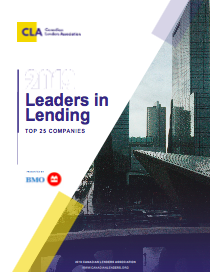 The Canadian Lenders Assocation (CLA) received 124 nominations for these awards from leaders in lending across the country. The CLA’s goal is to support access to credit in the Canadian marketplace and champion the companies and entrepreneurs who are leading innovations in this industry.
The Canadian Lenders Assocation (CLA) received 124 nominations for these awards from leaders in lending across the country. The CLA’s goal is to support access to credit in the Canadian marketplace and champion the companies and entrepreneurs who are leading innovations in this industry.
The Top 25 finalists in this report represent various innovations in the borrower’s journey from innovations in artificial intelligence powered credit modelling to breakthroughs in consumer identity management using blockchain technologies. These finalists also represent solutions for a wide spectrum of borrower maturity and needs, ranging from consumer credit rebuilding all the way to senior debt placements for global technology ventures.
See The Leading Companies Report Here
See The Leading Executives Report Here
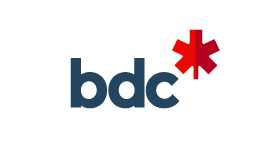 |
BDC
The 75 year old firm is the only Canadian bank devoted exclusively to supporting entrepreneurs. |
 |
Borrowell
Borrowell helps Canadians make great decisions about credit. They were the first company in Canada to offer credit scores for free, without applying for credit, and currently has over 800,000 users. Eva Wong and Andrew Graham were the joint recipients our the CLA’s awards in 2018. |
 |
Clearbanc
Clearbanc offers a new approach to capital access for entrepreneurs that uses AI to determine funding terms with a focus on unit economics and repayment through revenue share as a way to get founders access to the capital they need to fuel their growth. |
 |
CreditSnap
CreditSnap is a best in class pre-qualification and cross selling engine to deliver highly relevant pre-qualified loan offers to CreditSnap banks and CUs. |
 |
Dealnet Capital
Dealnet Capital services the home and retail sectors providing end-to-end financing plus innovative technology and communication solutions. |
 |
Espresso Capital
Since 2009, Espresso Capital has provided over 230 early and growth stage technology companies with founder friendly capital. Espresso offers lines of credit and term loans to enable entrepreneurs to grow their businesses without dilution, board seats, or personal guarantees. |
 |
Financeit
Financeit is a market leading point-of-sale consumer financing provider, servicing the home improvement, vehicle and retail industries. |
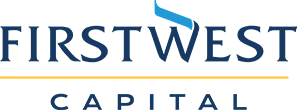 |
First West Capital
First West Capital is a leader in Canadian mid-market business funding. First West Capital helps ventures acquire and transition through innovative junior capital financing. |
 |
Home Trust
Home Trust Company is one of Canada’s leading trust companies. Home Trust offers Canadians a wide range of financial product and service alternatives, including mortgages, Visa cards, deposits and retail credit services. |
 |
Inverite
Inverite is the first Canadian designed, developed and focused real-time bank verification service. With coverage for over 240 Canadian FIs. |
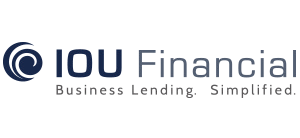 |
IOU Financial
Based in Montreal, IOU Financial provides small businesses throughout the U.S. and Canada access to the capital they need to seize growth opportunities quickly. |
 |
Lending Loop
Lending Loop is Canada’s first and only regulated peer-to-peer lending marketplace focused on small business. |
 |
Magical Credit
Magical Credit has been helping Canadians consumers get approved for quick and simple short term personal loans since 2014. They offer personal loans up to $10,000 regardless of the borrowers past financial issues or credit. |
 |
Manzil
Manzil is the market leader in the manufacturing and distribution of Islamic Financial products for Canadians who wish to balance material pursuits with their spiritual obligations. |
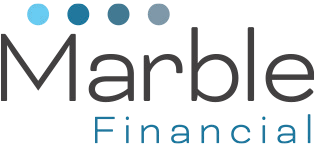 |
Marble Financial
Marble Financial uses smart technology and socially responsible lending practices to help Canadians rebuild credit once their past debt has been settled by a consumer proposal. |
 |
Owl
owl.co is a customer insight engine that helps financial institutions make better decisions. By connecting to tens of thousands of trusted data sources, Owl is able to instantly aggregate and synthesize millions of data points to learn more about customers and entities. |
 |
Paays
Paays is a Canadian eCommerce financing solution for a new generation of digital consumers seeking “point of inspiration” financing. |
 |
PayPal Canada
PayPal Canada recently announced a new SMB loan offering in Canada – a quick application process that can approve an applicant in minutes and transfer funds in one to two business days. |
 |
Progressa
Named by CB Insights to the 2018 Fintech 250, a list of the world’s top fintech startups, Progressa is Canada’s fastest growing financial technology lender focused on changing the way pay cheque to pay cheque Canadians access and build credit. |
 |
Shopify Capital
In its effort to become a one-stop e-commerce shop, Shopify Capital allows Shopify business owners to secure funding through revenue sharing on daily sales. |
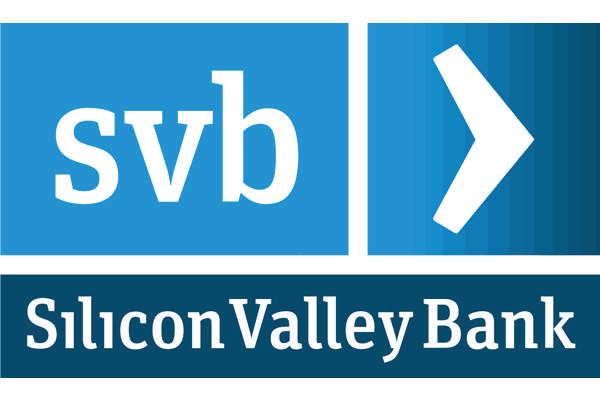 |
Silicon Valley Bank
For more than 35 years, Silicon Valley Bank (SVB) has helped innovative companies and their investors move bold ideas forward, fast. SVB provides a full range of financial services and expertise to companies of all sizes in innovation centers around the world. |
 |
Spring Financial
Spring Financial is a subsidiary of Canada Drives, one of the leading brands for auto financing in Canada. Spring provides accessible solutions for Canadians to establish a positive payment history. |
 |
Thinking Capital
Thinking Capital is a leader in the Canadian Online Lending space, leveraging technology to be at the forefront of the FinTech industry. Since 2006, they have helped more than 14,000 small-to-medium sized Canadian businesses reach their full potential |
 |
Uplift
Uplift’s mission is to make travel more accessible, affordable and rewarding by enabling travel providers such as JetBlue, American Airlines, and United to offer flexible payments to their customers. |
 |
Venbridge
Venbridge is a leading Canadian venture debt firm. Venbridge provides SR&ED, grant and digital media financing and consulting. |
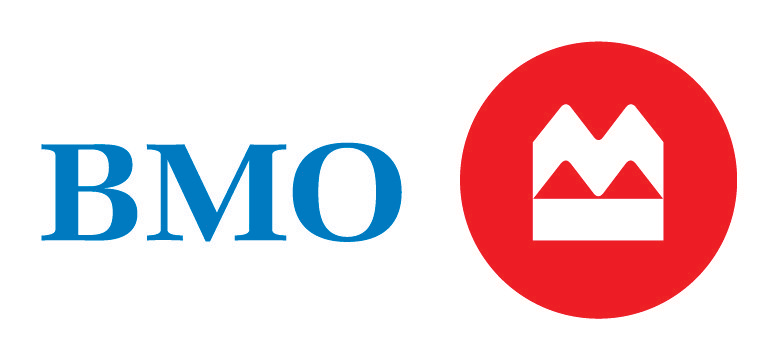
How Business Financing Has Changed
October 22, 2019 The first thing small business owners think about when deciding to take on funding to grow their business is the ten-year, 3% bank loan that was the standard ten to twenty years ago. The application and approval process was much slower, and if a borrower didn’t fit the mold that mainstream lenders were looking for, approval was difficult. Today, the business loan landscape has changed, and alternative financing methods have captured much of the market. Small business owners who can’t get approved by the banks have access to the funding they need to grow and expand their businesses.
The first thing small business owners think about when deciding to take on funding to grow their business is the ten-year, 3% bank loan that was the standard ten to twenty years ago. The application and approval process was much slower, and if a borrower didn’t fit the mold that mainstream lenders were looking for, approval was difficult. Today, the business loan landscape has changed, and alternative financing methods have captured much of the market. Small business owners who can’t get approved by the banks have access to the funding they need to grow and expand their businesses.
The technology that these alternative lenders use has made small business lending more accessible. Applications are online, underwriting techniques are fine-tuned and often times quicker, and borrowers get personalized offers and service.
More money is going out and more business owners are getting approved.
Changes in loan accessibility
Increased loan accessibility has resulted in more loans, but what does this mean for small business owners? And what are the risks to small business funders?
While alternative lending has opened up more doors for small business owners, as both the industry as a whole and individual lenders move faster, so increases the risk of people taking advantage of the system. Twenty years ago, fewer lenders meant that business owners had fewer options, but on the flip side, it meant that lenders didn’t need to worry as much about dishonest borrowing practices.
Increased competition pushes more lenders to approve more loans faster than ever. After all, if one lender won’t, another may, and the competition is just a Google search away. Unfortunately, this has also resulted in more opportunities for both borrowers and salespeople to take advantage of the system, and one of the largest risks to small business funders and small business owners alike is loan stacking.
What is loan stacking?
Loan stacking is used to refer to borrowers who take out multiple loans from multiple sources within a short window of time without thinking of their business’s long term health, due to the speed and efficiency that the funding occurs in, most business owners do not think twice as it becomes easy to obtain funding. Typically this situation occurs when a borrower can’t get approved for the total amount of money they need, or when a borrower is promised better rates at a future date by accepting the first offer from an overeager salesperson. The biggest red flag for all small business owners is when a promise is made without it being put in writing. If the funder or lender is not willing to put future promises on paper then steer clear of any future funding dealings.
Who is the culprit?
While some small business owners that cannot qualify for the full amount of cash they need may instead obtain multiple smaller loans to satisfy their requirements, others have more malicious intentions. Some borrowers take on funding for their business intending to use those funds for non-business related expenses. Whether it’s to go on vacation, pay down debt, or make a large purchase, this type of loan stacker may not fully understand the consequences of taking on more debt than their business can comfortably handle. During the funding verification calls, prior to funding, any mention of outside use for the funding can have a lasting effect on future funding relations.
An owner whose business is about to go under is another common offender. These borrowers make the decision to accept multiple funded deals, knowing that their business is at the end of its life, take the cash, close their bank accounts, and often declare bankruptcy, leaving the lender with no way to collect.
Finally, a small business owner may choose to lie to the lender about the purpose of the loan, thus convincing the lender to approve them for additional funding. A business loan to help with a larger long term project, like opening a new location that will bring increase revenue. But, when a borrower lies to a lender to get additional funding and thereby stacks loans on top of loans, this can become an issue.
While the borrower is often the offender, this isn’t always the case. Some brokers and salespeople prey on potential borrowers by employing aggressive and unethical sales tactics. “Baiting the borrower with a promise of a better rate down the line, but more importantly offering terms of approval that are unrealistic is a recipe for disaster. It is perfectly fine for any funder or lender to customize approvals to gain long term business relations, but to purposely or viciously offer unrealistic terms in the future, creates a need for a “Small Business Funding Code of Ethics”. Long term funding relationships are created with trust, transparency, and willingness to meet halfway. With the right Code of Ethics in place, the entire Small Business Funding industry can shine above all other financing,” explains Paul Pitcher, managing Partner at First Down Funding and SharpShooter Funding. Often these borrowers have just taken on a loan, probably for less than they had originally wanted, and the prospect of additional funds is quite appealing. The problem is that this often leaves the borrower overstretched, putting all parties at risk.
Understand the risks & signs
Business owners who stack loans are not only affecting the lenders they obtain funding from but are putting both their personal and business finances at risk. “Every business owner must analyze their 30, 60, and 90-day cash flow in order to better serve the purpose and total cost of capital for all rounds of funding” explains Pitcher.
Chances are if a lender doesn’t approve a business owner for the full amount they wanted, it’s because their finances can’t handle more and the lender did not want to put the business in a difficult position. After all, it is in the best interest of the lender for the small business to succeed.
In many cases, a business owner could be personally liable for their debt. However, aggressive brokers looking to quickly cash in on loans commissions put lenders at risk as well. Therefore, funders need to be wary of both deceptive business owners and lenders.
Prevention
When it comes to prevention, most lenders benefit from a three-pronged approach; a strong underwriting system, helpful consumer education, and open communication with the competition. “The most important part of funding deals day-to-day is the strength and volume of business and personal references. When the inner circle of the business owner vouches for them positively, 99% of the time, the deal can fund cleanly and perform,” explains Pitcher.
A strong underwriting system and a solid set of procedures can help lenders make sure they don’t unknowingly enter into a cycle of loan stacking. Experience plays an important role, but if you have a strong understanding of what you’re looking for and perform the appropriate amount of due diligence, you should be able to prevent the majority of loan stacking. Nevertheless, most small business funders already have such systems in place and yet loan stacking is continuously growing problem.
An informed applicant becomes a great borrower. Dealing with a frustrated business owner who can’t get approved for the full amount they want, is never fun. But, educating them about why they can only qualify for a certain amount is a key component in preventing loan stacking and ensuring a borrower isn’t taken advantage of. “The first impression a funder gets from an owner, a hand-signed and dated application, and the organizational skills needed to send over prepared financials and bank statements, can say a whole lot about the business owner’s interests, intentions, and overall health. The more rushed we feel, the less likely we will want to work with that said business,” explains Pitcher.
Finally, chatting with your competition might not seem like a great idea, but maintaining open lines of communication with those in your industry can help spot loan stacking schemes before they get out of hand. Trade shows and other industry events are a good place to network and meet other industry stakeholders.
Closing
Running a small business takes time, persistence, passion, and money. This is why small business owners need funders to be on their side of the court.
Educating and providing borrowers with useful information at the right time can help reduce the risk of loan stacking and helps to maintain healthy accounts.
BFS Capital Launches Canadian Tech Hub
October 16, 2019 Small business lender BFS Capital is making an expansion push with the creation of a new data science and engineering hub in Toronto. BFS, which serves customers in a trifecta of jurisdictions that in addition to Canada includes the U.S. and the UK, has undergone a technological transformation that includes building out a tech team for the next generation of the firm’s products.
Small business lender BFS Capital is making an expansion push with the creation of a new data science and engineering hub in Toronto. BFS, which serves customers in a trifecta of jurisdictions that in addition to Canada includes the U.S. and the UK, has undergone a technological transformation that includes building out a tech team for the next generation of the firm’s products.
BFS Capital CEO Mark Ruddock took some time to discuss the Toronto expansion with deBanked.
“We have an ambitious roadmap and plan to innovate quickly,” said Ruddock, “As a result, we had to ask ourselves, where could we best do this? We looked at cities across North America with strong tech and data science talent, and which were millennial friendly. We were frankly quite surprised by Toronto. Something fundamental is happening in Toronto – it’s fast becoming a leading city for data science, AI, and mobile app development in North America.”
Indeed, deBanked hosted its inaugural Canadian event in Toronto this past July after keeping an eye on its burgeoning fintech scene there for years.
“We are seeing a fundamental transformation happening in our customer base, from a less digitally savvy generation of entrepreneurs willing to accept the traditional financial products to a demanding, digital first generation, seeking new financial solutions,” said Ruddock, pointing to a two-pronged approach of real-time algorithmic decisioning and a mobile-first user design. “The intersection of those two things is the tipping point for small business financial services for the next while,” he added.
BFS Capital is finding that the younger generation is well equipped with technological skillsets, noted Ruddock, pointing to the Universty of Toronto and University of Waterloo as two of the best schools in North America for tech talent.
Merchant Advance Capital Rebrands to Merchant Growth
July 3, 2019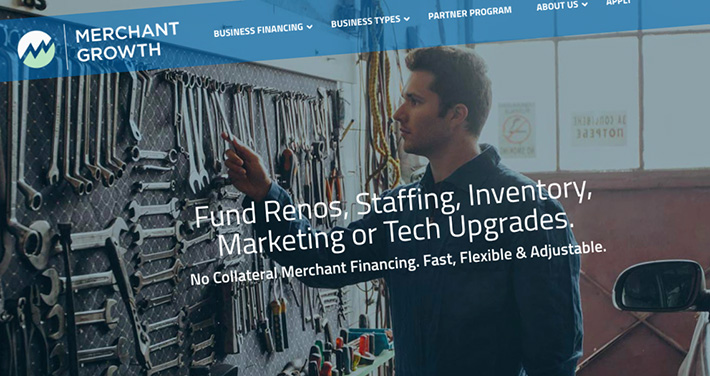 Merchant Advance Capital, which trumpets itself as Canada’s fastest and most transparent small business financier, is rebranding as Merchant Growth.
Merchant Advance Capital, which trumpets itself as Canada’s fastest and most transparent small business financier, is rebranding as Merchant Growth.
The company has offices in Vancouver, BC and Toronto, ON and was founded in 2009.
“I founded our company out of my apartment 10 years ago,” David Gens is quoted as saying in a company announcement. Gens is the company’s president & CEO. “Back then our mission was simply to provide credit to small businesses, and we did that by providing one product, called a ‘merchant advance’. Today, we offer a comprehensive suite of financing solutions delivered with unparalleled convenience. In doing so, our mission has expanded to allowing business owners to achieve unconstrained growth, while reducing the administrative stress of running a business. As we’ve transformed our focus from one credit product to this far-reaching mission, we felt the need for our name to reflect this. We are Merchant Growth.”
Gens has been an oft-quoted source in deBanked over the years. His company closed on a $30 million debt facility last year with Comvest Credit Partners.
Gens is also speaking at deBanked CONNECT Toronto on July 25, 2019. You can register to attend at www.debankedcanada.com.





























